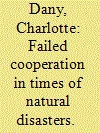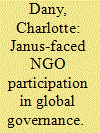| Srl | Item |
| 1 |
ID:
174858


|
|
|
|
|
| Summary/Abstract |
This article asks why economically strong democracies reject humanitarian aid after severe natural disasters, focusing on the Kobe earthquake in Japan (1995), India’s response to the Indian Ocean tsunami (2004), and Hurricane Katrina in the United States (2005). It explains these rejections of humanitarian aid by analyzing the decision-makers’ ‘self-perceptions’ through the factors of manageability, national role perceptions, and domestic political impact, as well as ’other-perceptions’ through their relations to donors and the nature of the aid offers. It finds that even in those disaster-prepared and economically strong democracies, state leaders rejected humanitarian aid not simply because they had sufficient disaster management capabilities. Rather, bureaucratic hurdles and administrative failure impeded aid acceptance. Moreover, conceptions of those countries’ roles as established or emerging donors, as well as domestic political factors influenced their decisions. Ultimately, the dominant explanations focusing on wealth and capabilities are thus too shortsighted. Not only giving but also rejecting humanitarian aid follows political considerations.
|
|
|
|
|
|
|
|
|
|
|
|
|
|
|
|
| 2 |
ID:
133479


|
|
|
|
|
| Publication |
2014.
|
| Summary/Abstract |
Increasingly, nongovernmental organizations participate in negotiations within international organizations as well as in global working groups and discussion forums. This trend is commonly said to enable the influence of the participating NGOs. Yet this article highlights the negative effects of the high level of NGO participation on the NGOs' influence. It shows, in the case of the UN World Summit on the Information Society, how the NGOs' influence is reduced to less relevant issues and how this influence turns out to be highly selective: while the views and demands of a few NGO actors are successful, more diverse views from the broader NGO community become neglected. This suggests greater caution regarding the usual claim that more is necessarily better with regard to NGO participation in global governance.
|
|
|
|
|
|
|
|
|
|
|
|
|
|
|
|